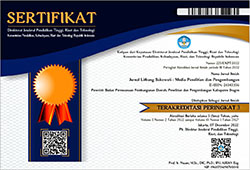KEBERLANJUTAN SISTEM PENYEDIAAN AIR MINUM PEDESAAN BERBASIS MASYARAKAT
DOI:
https://doi.org/10.32630/sukowati.v4i2.131Keywords:
water supply, sustainability, human capital, social capitalAbstract
PAMSIMAS is a government program to meet basic service needs that are not served by the public system in rural areas through the development of community-based drinking water supply systems. But in the post-construction development, it turns out that the SPAM Desa was built experiencing different developments. This study aims to determine the sustainability of community-based rural drinking water supply and the factors that influence this sustainability. This study uses a qualitative approach with a case study method in four villages in Purworejo Regency, namely the villages of Piji, Tridadi, Jelok, and Gintungan. The analysis was conducted using comparative analysis with research data derived from observations, interviews, and secondary data. The results showed that villages with sustainability in social, financial, environmental, institutional, and technical aspects have a very good level of sustainability while villages with sustainability in just one aspect have a low level of sustainability. The sustainability of SPAM Desa is influenced by social capital and human capital they have. Social capital factors that influence in the form of a strong network of social relationships, trust, and rules norms, while human capital factors that influence the form of motivation, commitment, work team effectiveness and leadership.
Downloads
Published
How to Cite
Issue
Section
License
Copyright (c) 2020 Andito Sidiq Swastomo, Doddy Aditya Iskandar

This work is licensed under a Creative Commons Attribution 4.0 International License.


















